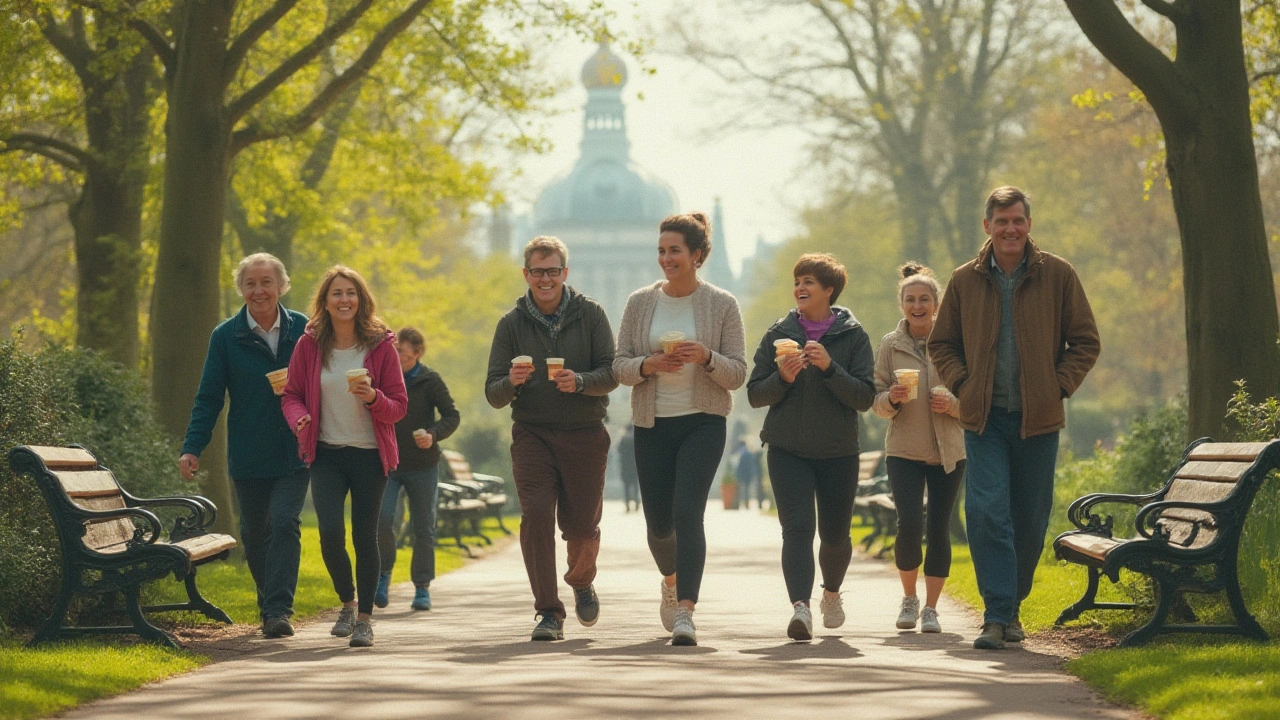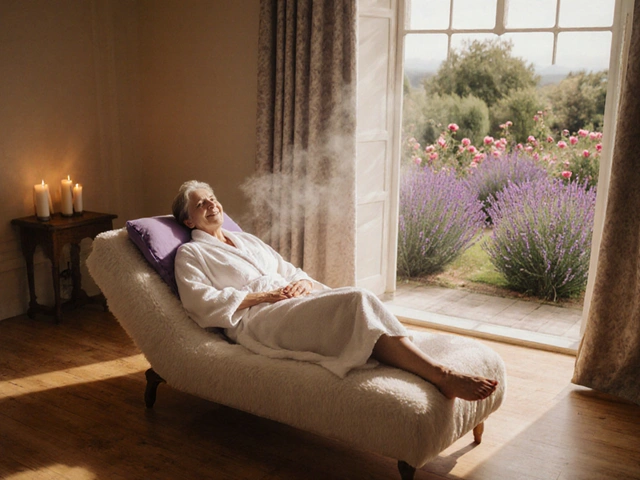Picture this—your brain's running on all cylinders, ideas sparking, memory sharp, mood steady, and focus locked in for hours. No, this isn't a fantasy. There’s a movement out there combining ancient wisdom and next-gen science, all aimed at boosting brain power for real. Bioenergetics isn’t some magic bullet but a real, grounded approach that’s gathering steam with neuroscientists, fitness coaches, and even sleep specialists. This isn’t just about eating blueberries and hoping for the best. We're talking about understanding how energy flows in your body and using that to wake up your mind for good.
What Is Bioenergetics? The Science Behind the Buzz
At its core, bioenergetics is all about how the body manages and uses energy—every heartbeat, muscle movement, or fleeting thought. But where does brain power fit in? Think of the brain as a greedy energy hog, slurping up a whopping 20% of your body's total energy even though it’s only 2% of your weight. Even tiny tweaks in how your body manages this energy can tip your focus, creativity, and mood for better or worse.
The science isn’t wishy-washy here. We know, through fMRI scans, that neurons fire like city grids at night when they're well-fueled, leading to quick reactions and big mental wins. The mitochondria—the cell’s energy plants—play DJ, spinning out ATP (that’s short for adenosine triphosphate), which powers thinking, memory, and even how fast you process a new TikTok dance. When the energy’s low, fog sets in; connections slow, focus fizzles, and your mood tanks.
Bioenergetics doesn’t just stop at the mitochondria, though. It's about how you breathe, move, eat, and sleep—stuff most folks overlook. Top universities like Harvard and Stanford are running studies labeling bad sleep as an energy thief that sabotages mental performance. Meanwhile, European labs track how chronic stress messes with ATP production, making you sluggish inside your own head. And here’s a kicker: evidence from athletes using high-intensity interval training (HIIT) shows their energy metabolism and mental sharpness get a double upgrade. This all paints a big, clear picture—if you master how your body turns food and oxygen into energy, your brain rewards you with mental clarity, deeper focus, and more motivation on tap.
The great part? You don’t need a lab coat or expensive biohacking gear to get started. You just have to speak your body’s energy language—from the food you eat to the way you move to how you set your day-to-day rhythm. That’s where everything gets interesting.
Daily Habits That Supercharge Brain Power With Bioenergetic Strategies
Let’s get practical because nobody has time for theory alone. You can layer bioenergetic tweaks into your day without making your schedule scream. It's the tiny shifts that add up to big gains.
First, pay attention to your breathing. You might think you breathe fine, but check this: most people default to shallow chest breathing when stressed or hunched over screens. That airflow starves your brain of oxygen. Just five minutes of slow, deep diaphragmatic breathing (think “belly breathing”) boosts oxygen transfer—something research published in Nature Human Behaviour shows leads to a measurable uptick in memory and focus scores among office workers.
Diet lands next. Forget crash diets or mysterious “brain pills.” The real brain-fueling champions are unprocessed, nutrient-dense foods that crank up mitochondrial performance. Aim for omega-3-rich fish like sardines, wild salmon, and even eggs from pasture-raised hens. Some schools in Finland snuck in fish twice a week and tracked kids for a year—their test scores and emotional regulation improved, and teachers noticed fewer “foggy” hours in class. Dark leafy greens, berries, walnuts, and even a modest square of dark chocolate (above 70% cocoa) can boost that cellular energy machinery.
Hydration’s another underestimated player. The brain sits in a watery soup, and electrical signals literally slow when you get low on fluids. So, sip steadily—not just guzzle at lunch. Sneak in a big glass right after you wake up; overnight, you lose up to half a liter through breathing and sweat. That easy fix can lift your mental state in minutes.
Movement doesn’t have to mean hours at the gym. The best bioenergetic hacks for busy folks are “exercise snacks”—short bursts of movement. Science from McMaster University found these two-minute activity breaks throughout the workday beat a single, long workout for boosting mood and attention. A couple of jumping jacks, a walk up the stairs, or quick shadow boxing jolts the mitochondria in your brain’s nerve cells.
Don’t skip on sunlight. Just 10-15 minutes outdoors in the morning resets your internal clock (called your circadian rhythm), helping your mitochondria schedule their energy release. The American Academy of Sleep Medicine noticed that folks grabbing morning light saw sharper focus and more sustained energy during the afternoon slump.
All these habits work together—like instruments tuning up for a power-packed symphony. Nail the basics consistently and your brain’s energy flow becomes unstoppable.

Bioenergetics and Stress: Energy Roadblocks Nobody Talks About
Here’s where things get real. You could crush it with food, exercise, and sleep, but chronic stress sneaks in and pulls the rug out from under you. Stress chemistry dumps out cortisol and shoots your body into “fight or flight” mode, rewiring energy production from smooth and clean to jittery and chaotic. It’s like running a race on a diet of junk food and coffee—you might survive, but you’re not thinking at your best.
What’s wild is how subtle these stress roadblocks can be. Missed deadlines, relationship friction, or just doom-scrolling the news are all enough to mess with your bioenergetic balance. The University of California, San Francisco tracked college students through a semester. They found higher stress linked directly to lower ATP output, slower word recall, and reduced concentration. Yikes.
But you’re not powerless. First up: embrace micro-breaks. Every hour, step away from the screen—even just to stretch or stare out the window. Brain-imaging studies show a literal uptick in blood flow to the prefrontal cortex after these short resets, restoring sharp thinking.
Meditation doesn’t have to be stiff or “crunchy.” Five minutes of guided mindfulness—just sitting, eyes closed, focusing on the breath—has been shown in studies at Massachusetts General Hospital to recharge ATP in the brain and drop stress hormones fast. Apps like Headspace or Calm make this super accessible, or you can use YouTube for quick, no-fuss guidance.
Social connection, even over a quick lunch or text, also shifts you out of “fight or flight.” Laughter, eye contact, and just feeling seen have biochemical effects—spiking endorphins and lowering the energy-burn of anxiety. If you’re typically solo, even a virtual game night or a weekly call with a friend can keep your energetic circuit flowing smooth.
Stress may be inescapable, but these counter-strategies are like building detours around the worst energy blocks. Stack enough of them together, and you build more than resilience—you fire up mental speed, stamina, and creativity.
Next-Level Bioenergetic Tools: Beyond the Basics
If you’ve got the main moves down, there’s a whole toolbox of upgrades waiting to be tried—nothing extreme, but solid science supports their potential. Gadgets like red and near-infrared light panels have jumped from gyms into living rooms for good reason. Studies from Boston University show short sessions a few times per week (morning or evening) spur mitochondrial repair in brain cells and lift mood. Not ready for gadgets? Even spending time in natural sunlight during golden hour (sunrise or sunset) delivers similar mitochondrial perks.
Cold plunges aren’t just an Instagram fad. The science says one to three minutes in a cold shower or a chilly lake triggers a release of neurotransmitters, like dopamine, that amplify alertness and motivation. Wim Hof, the Dutch “Iceman,” may be the poster boy here, but Swedish office workers doing brisk cold showers saw their sick days drop and productivity rise within a couple of weeks—backed by research from Stockholm University.
Supplements get hyped, but a few have real legs. Creatine, known for gym buffs bulking up, also shows promise for focus and working memory—especially on sleep-deprived days. Supplementing with CoQ10 (coenzyme Q10), a compound involved in energy production, shows small but legit benefits in attention and cutting mental fatigue, according to clinical trials out of Japan and Australia.
Breathework methods like box breathing or alternate-nostril breathing also get a nod from the U.S. Navy SEALs. These techniques regulate your nervous system, keep energy delivery to your brain steady, and can boost performance under pressure.
If you’re intrigued by digital tools, cognitive training apps like Lumosity or Elevate might offer small improvements in executive functions (planning, focus, and flexible thinking), especially when paired with real-world learning or challenges.
The thing is, these advanced tricks only shine when stacked on a solid foundation. No supplement or device can mask a scattered routine or low-nutrient diet. But, dial in the basics, and each bonus tool amps up your brain’s bioenergetic punch.

Real-Life Success: Stories and Tips From People Who Made Bioenergetics Work
You don’t have to take a leap of faith. Hundreds of stories back up the science, putting a face to the stats and studies. Like Jake, a 38-year-old copywriter who struggled through 2pm slumps for years. Swapping his morning donut for fried eggs and spinach, using exercise “snacks,” and catching daylight before work saw him write sharper copy and cut his afternoon coffee habit in half within six weeks.
Or Nina, a project manager, who turned around her foggy Mondays by using box breathing before tough meetings and committing to one unplugged walk outside at lunch daily. Not only did her headaches vanish, but her manager actually noticed her presentations got punchier and her team morale “lifted.”
Then there’s Tom, an app developer, who added three minutes of cold showers, a CoQ10 supplement, and red light therapy (ten minutes in the evening while chilling with a book). He claims brainstorming sessions became his new superpower—ideas flowed, and his after-dinner crashes mostly disappeared.
Trainers and coaches now recommend these bioenergetic tweaks for teens struggling with exams, remote workers fending off screen fatigue, and older adults hoping to keep their brain nimble. You don’t need to chase fads or pour money into fancy treatments—just pick the strategies that fit your vibe and routine. Mix, match, and iterate as you get feedback from your own energy and focus shifts.
The secret comes down to treating your body’s energy production as priority #1. The more in tune you get with these signals, the clearer and more powerful your thinking becomes—without draining your wallet or playing pharmaceutical roulette.
Want big mental wins for your investment? Sink into bioenergetics as your go-to upgrade. Every tweak fires up your brain for smarter thinking, deeper focus, and a steady mood—without the burnout. Try a couple of daily swaps for a week and see what shifts for you. The best part? Unlike most trends, these bioenergetic tricks are built to last and actually feel good. Why settle for brain fog, when science offers a way out?





